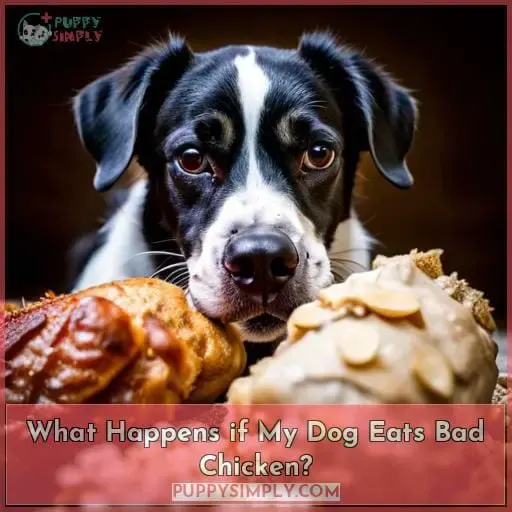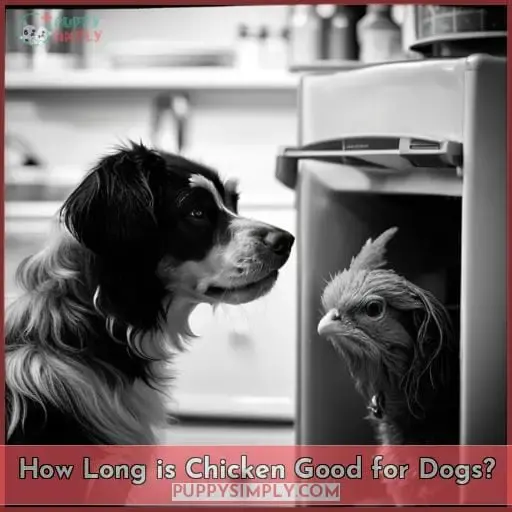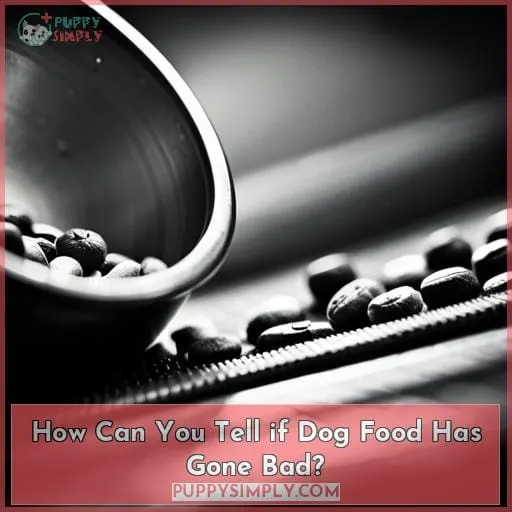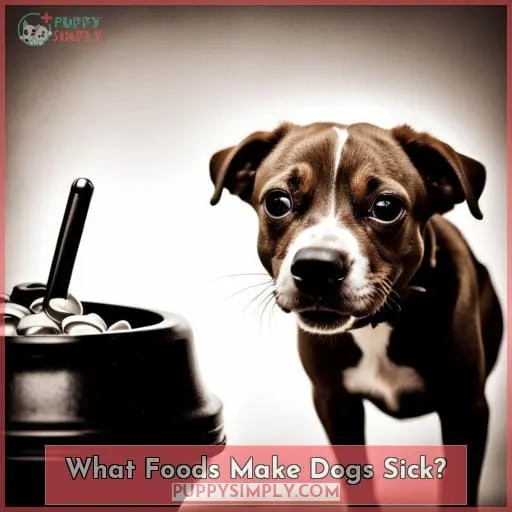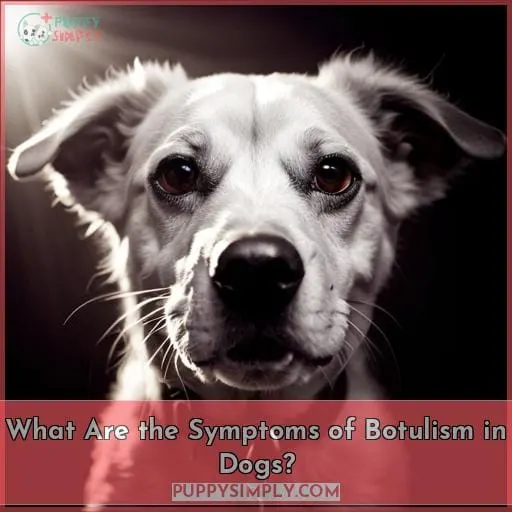This site is supported by our readers. We may earn a commission, at no cost to you, if you purchase through links.
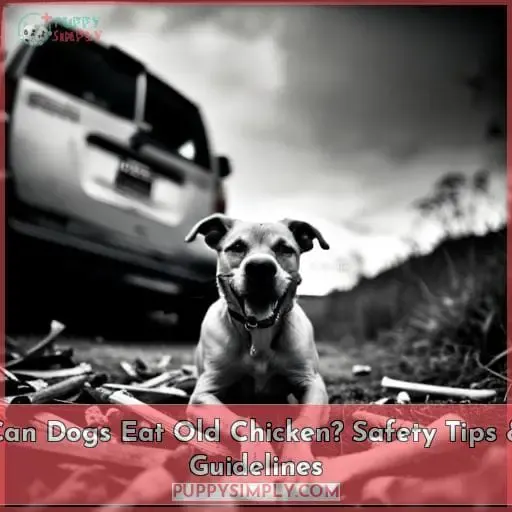
While some pups may enjoy snacking on leftovers from time to time, there are a few things you should know before offering your pup expired or spoiled poultry. To start with, eating bad chicken could make your dog sick and cause various health issues depending on how long the food has been around and their individual sensitivity to bacteria in rotten foods.
Additionally, different types of bacteria found in raw or cooked poultry can have varying effects on dogs, so understanding these risks is important too! This article will provide an overview of safety tips and guidelines regarding whether or not dogs can eat old chicken, as well as other key considerations like storage methods and warning signs that suggest something isn’t quite right with your pup’s meal choice.
Table Of Contents
- Key Takeaways
- Can Dogs Eat Expired Chicken?
- What Happens if My Dog Eats Bad Chicken?
- How Long is Chicken Good for Dogs?
- Can Chicken Make Dogs Sick?
- How Long Does Cooked Chicken Last in the Fridge for Dogs?
- How Can You Tell if Dog Food Has Gone Bad?
- What Foods Make Dogs Sick?
- What Are the Symptoms of Botulism in Dogs?
- Can Dogs Eat Chicken Left Out Overnight?
- Things to Consider
- Frequently Asked Questions (FAQs)
- Conclusion
Key Takeaways
- Dogs should not be fed old or spoiled chicken.
- Feeding too much chicken can cause obesity and liver/kidney problems in dogs.
- Cooked bones can choke dogs and cause gastrointestinal/esophageal injuries.
- Signs of spoiled chicken include sliminess, foul odor, and color changes.
Can Dogs Eat Expired Chicken?
You should exercise caution when feeding any expired chicken to your pup, as it may contain bacteria or toxins that could make them sick. Dogs are omnivores and can eat old cooked chicken if there’s no visible mold. However, raw diets for dogs aren’t recommended due to the potential health risks associated with consuming spoiled meat.
Feeding too much chicken can cause obesity and liver/kidney problems, so keep portion size in mind when serving up meals! It’s important to check expiration dates on packaged food before feeding it to your dog.
Opened dry dog food can be fed up to 3 months past its best-by date, while canned foods typically last 5-7 days after being opened.
Make sure you remove all bones from the meal before giving it to Fido as well! Also, avoid adding garlic or onion seasoning to their dish, as these ingredients are toxic for animals of all kinds! Finally, consult a veterinary nutritionist or take advantage of pet food delivery services if you’re unsure about nutritional needs for optimal canine health.
What Happens if My Dog Eats Bad Chicken?
If your pup has eaten bad chicken, they may experience symptoms such as vomiting, diarrhea, reduced appetite, and lethargy. Food poisoning can occur if the chicken is contaminated with bacteria like Salmonella or Clostridium perfringens.
Spoiled or expired raw chicken may contain pathogens that make dogs seriously ill. Cooked bones pose a choking hazard and can cause gastrointestinal/esophageal injuries. A raw diet for dogs isn’t recommended due to potential health risks associated with consuming spoiled meat.
It’s important to practice safe storage methods when handling any kind of poultry for pets to avoid contamination from toxins/pathogens. Foods toxic to canines, such as chocolate and onions, should also be avoided. If you suspect your pet has ingested bad chicken, immediately seek veterinary care.
Bloody diarrhea could indicate botulism, which causes paralysis of muscles and disturbed vision in animals.
How Long is Chicken Good for Dogs?
When it comes to feeding your furry friend, you need to be aware of how long chicken can last for dogs. Proper storage guidelines and recognizing the signs of spoiled chicken are essential in keeping your pup healthy and safe from food poisoning.
Keep reading to learn more about storing cooked or uncooked chicken safely as well as what signs indicate that the poultry has gone bad before feeding it to your four-legged family member.
Storage Guidelines
It’s important to take extra precautions when storing chicken for your pup, since even a few days past the expiration date can be dangerous.
To ensure food safety and avoid risk factors like food poisoning:
- Check the quality control of purchased items.
- Observe hygiene practices when handling raw chicken.
- Discard any spoiled or expired dog food.
- Avoid sudden changes in diet when bacteria is present.
- Refrain from feeding dogs uncooked or old chicken.
Quality control and proper storage are key to preventing issues associated with bad poultry.
Signs of Spoiled Chicken
Be mindful of the signs that your chicken has gone bad, such as sliminess, foul odor, and color changes. Spoiled or expired poultry can cause foodborne illnesses in dogs if ingested. Raw chicken should be avoided due to potential salmonella contamination.
It’s important to understand a dog’s nutritional needs for optimal health and safety when feeding them old or iffy chicken. Signs of illness include vomiting, diarrhea, reduced appetite, and lethargy. These could indicate botulism poisoning from contaminated meat, so watch out for those symptoms! Regularly check with veterinary nutritionists or use food delivery services to ensure your pup is getting fresh meals without any risk factors.
Can Chicken Make Dogs Sick?
It’s important to be aware of the potential risks associated with feeding your dog old chicken. Garbage gut, salmonellosis, clostridium perfringens, obesity, and choking hazards are all possible outcomes if dogs eat spoiled or expired poultry.
Not only can these illnesses cause long-term damage to their health, but they may also require medical treatment in order to fully recover from such foodborne illnesses.
Garbage Gut
You’re likely familiar with the term ‘garbage gut’ – it’s an uncomfortable condition that your pup may develop if they eat spoiled or expired chicken, which can lead to serious illness. Bacterial infections and pathogen exposure from eating spoiled meat are common causes of garbage gut.
Diet changes and not meeting nutritional needs can also result in this problem for dogs, as well as consuming too much muscle meat compared to organ meats needed for coat health. Nutritional imbalances caused by a lack of variety in diet could be another warning sign.
Consulting a veterinary nutritionist is recommended for finding out what food should be included in their meals.
Salmonellosis
Watch out for salmonellosis, a bacterial infection that can make your furry friend seriously ill if they consume old chicken. Salmonella is a common pathogen found in raw meat and poultry, so practice good hygiene when handling these foods to prevent contamination of surfaces and utensils.
Symptoms of salmonellosis include vomiting, diarrhea (sometimes bloody), fever, dehydration, and low energy levels. Muscle paralysis may also occur if the pet ate old chicken contaminated with toxins such as botulism.
Feeding pets too much muscle meat over organ meats needed for coat health could cause nutritional imbalances leading to garbage gut, a serious illness requiring medical treatment.
Clostridium Perfringens
Feeding your pet raw or spoiled poultry meat can lead to Clostridium perfringens, a bacterial infection that causes gastrointestinal upset in dogs. Symptoms of food poisoning may include vomiting, diarrhea (sometimes bloody), reduced appetite, lethargy, and dehydration.
Before feeding your canine old chicken, it’s important to check for mold and bacteria, as well as signs of spoilage like sliminess or a foul smell. Cooked chicken should not be stored for longer than four days, while opened dry food can last up to three months past the best-by date.
Pet parents must also ensure not to feed their pets toxic foods such as chocolate, onions, alcohol, or macadamia nuts, which could cause serious illnesses if ingested! Take caution when preparing meals for your pup.
Obesity
Be mindful of portion size when feeding your pup chicken, as too much can lead to obesity and associated health issues. A raw diet isn’t recommended by the American Veterinary Medical Association due to potential foodborne illness risks.
Instead, offer a fresh food diet tailored for your pet’s individual nutritional needs.
High protein diets are especially beneficial for certain canine breeds. However, it should be noted that the wrong type or amount could cause digestive upsets or even long-term damage to their system if left unchecked.
Feeding too much chicken in an already unhealthy diet can quickly aggravate existing weight problems in dogs and puppies alike.
Choking Hazards
Avoid giving your pup chicken bones, as they can pose a choking hazard and cause gastrointestinal or esophageal injury. Small bones may break down in the gut and create perforations that require surgery.
Raw chicken is also dangerous to dogs due to bacteria growth, so it’s best avoided altogether. Food poisoning from expired food or old chicken can cause muscle paralysis, disturbed vision, difficulty chewing or swallowing, and weakness.
A fresh food diet tailored for your pet’s individual nutritional needs is the safest way to ensure their health stays on track.
How Long Does Cooked Chicken Last in the Fridge for Dogs?
Transition: It’s important to be aware of the potential risks associated with feeding your dog old chicken.
When it comes to cooked chicken, you should consider how long it will last in the fridge for your pup. If stored properly, cooked chicken can last up to four days in the refrigerator and three months if kept frozen.
When looking at dry or canned food, opened bags can usually be fed up until 3 months after their best-by date, while opened cans should typically be consumed within 5-7 days after opening them. However, these timeframes are only estimates as freshness is key when determining whether a product has expired or not.
Additionally, remember that bacteria growth and food poisoning may occur on raw poultry left out overnight due to toxin production. So always strive towards providing fresh meals with proper nutritional needs met, either through veterinary nutritionists’ advice or specialized dog foods prepared specifically per breed size & dietary restrictions (like grain-free).
Finally, keep an eye out on deli meats like hot dogs & packaged lunchmeat, which could cause obesity if overfed, along with choking hazards from cooked bones too large.
How Can You Tell if Dog Food Has Gone Bad?
It’s important to check for signs of spoiled food, such as sour or rancid odors, moisture, mold, and bugs, before feeding your pup. Knowing how to spot these can help you avoid any dietary risks that could arise from serving old food.
- Spoiled dog food will often have a sour/rancid odor.
- Look for the presence of bacteria like mold or bugs.
- Opened dry dog food should be used within 3 months after the best by date.
- Canned foods should generally be consumed within 5-7 days after opening them.
- Always strive to provide fresh meals with proper nutritional needs met.
Pet owners must also consider the presence of certain toxins due to spoilage, which may lead their pups to require antibiotics if a bacterial infection is present.
What Foods Make Dogs Sick?
Be aware that certain foods can make your pup sick, such as chocolate, onions, alcohol, grapes, and macadamia nuts – or even spoiled meat with bacterial pathogens.
Eating old chicken can lead to food poisoning due to the presence of Salmonella or Clostridium perfringens, which could cause stomach pain and salmonellosis in dogs. Raw chicken should be avoided due to its potential for harboring bacteria, which could cause neurological signs like muscle paralysis if ingested by pets.
If you’re feeding a fresh diet tailored specifically per breed size & dietary restrictions (like grain-free), it’s important to consult a veterinary nutritionist or specialized delivery service so all nutritional needs are met properly without any health risks involved in serving old food such as canned products with preservatives & artificial ingredients not suitable for your pet’s long-term well-being!
Symptoms of garbage gut include fever, diarrhea, and vomiting; these may require medical treatment depending on their severity.
What Are the Symptoms of Botulism in Dogs?
Signs of botulism in dogs include muscle paralysis, disturbed vision, difficulty chewing or swallowing, and weakness.
The symptoms typically start with progressive motor paralysis that slowly spreads across the body until it affects any voluntary muscle movement a dog has control over. In addition to this, they may experience disturbed vision and have issues closing their eyes or focusing on objects at a distance.
They may also have difficulty chewing or swallowing food due to a lack of facial mobility, and general weakness leading them to refuse canned food unless forced into eating it by hand-feeding methods.
A veterinary nutritionist should be consulted when considering fresh diets tailored specifically per breed size and dietary restrictions, as these foods carry potential health risks. Pathogens found in raw chicken, like salmonella infection and clostridium perfringens spores, could cause gastrointestinal upset if ingested.
This is even more of a concern for puppies, who are more prone to developing illness from contaminated meats than adult dogs.
It’s also important for owners to not only monitor what type of foods are being served but also their quality and freshness. This way, they don’t risk putting their pup under stress from eating spoiled products containing bacteria toxins capable of causing serious harm.
Can Dogs Eat Chicken Left Out Overnight?
Avoid feeding your pet chicken left out overnight as it could contain bacteria and toxins that can make them seriously ill. Safe handling of poultry meat for canines is essential for their health, so always check the expiration date to ensure you’re providing fresh food items.
It’s important to consider your dog’s individual nutrition needs when deciding what type of wet or dry dog food they should consume on a regular basis. You may also want to look into professional veterinary nutritionists or specialized meal delivery services tailored specifically towards canine diets to provide nutritionally balanced meals without the risk of contamination from raw or old poultry meat.
Additionally, cooked bones should be avoided due to potential choking hazards and gastrointestinal issues caused by sharp fragments that may cause injury if swallowed. When serving up meals containing chicken products, keep an eye out for any signs that may indicate spoilage, such as sour odors or sliminess.
This could severely compromise your pup’s safety if ingested over extended periods, resulting in them becoming sick with severe medical conditions like salmonellosis and botulism poisoning.
With proper supervision, along with quality assurance methods like temperature checks throughout storage timeframes, combined with a careful selection process during purchasing stages, will help prevent dogs from getting sick from old poultry meats while keeping everyone safe!
Things to Consider
It is important to consider your dog’s individual nutrition needs when deciding what type of wet or dry dog food to provide them on a regular basis. Many veterinarians prefer that pet owners feed their canine companions fresh foods tailored specifically towards a balanced diet, rather than relying solely on raw diets for dogs.
Alternatively, there are professional veterinary nutritionists and specialized meal delivery services available who can help ensure the safety and quality of meals containing chicken products without the risk of contamination from old poultry meat.
Raw Diet
Though raw diets can be tempting, they may come with unexpected health risks that outweigh their potential benefits. Veterinarians recommend considering your pet’s nutritional needs and consulting a professional nutritionist for guidance on the best diet plan.
Alternatively, specialized food delivery services provide nutritionally balanced meals tailored to canine diets without contamination from raw or old chicken products. Good hygiene practices when handling poultry are essential to prevent bacteria growth and toxin production, which could make your pup seriously ill if ingested over extended periods.
To ensure safety, check expiration dates of commercial pet foods, as well as signs of spoilage such as sour odors or sliminess, before feeding them to your furry friend!
Fresh Food Diet
Feeding your pup a fresh food diet is the preferred choice by veterinarians as it provides optimal nutrition and helps keep them healthy. Pet owners should consider consulting with veterinary nutritionists to ensure their dog receives proper nutrients or use specialized food delivery services for convenience.
When preparing meals at home, make sure to be mindful of quality and freshness. Bad hygiene when handling poultry can lead to contamination from pathogens and toxins, which may cause serious illnesses in dogs if ingested over extended periods.
Lean meat, such as chicken, is ideal due to its high protein content, while red meats are best for high-energy dogs.
Proper dietary choices will not only benefit Fido’s health but also enhance his overall wellbeing!
Frequently Asked Questions (FAQs)
Is raw chicken safe for dogs to eat?
No, raw chicken is not safe for your pup. Eating it can cause food poisoning and other illnesses due to bacteria or toxins in the meat. Your dog’s health will be better served with fresh, cooked meals that meet their nutritional needs.
Are there certain foods that are toxic to dogs?
Are there certain foods that are toxic to dogs? Absolutely; chocolate, onions, alcohol, grapes, and macadamia nuts can all be deadly.
What are the signs of spoiled chicken?
Signs of spoiled chicken include sliminess, a foul smell, and color changes – all of which can be dangerous for dogs.
How long can opened canned dog food be stored?
Opened canned dog food should be used within 5-7 days. In general, it’s best to feed your pup fresh food for optimal health and safety; spoiled or expired pet food can cause gastrointestinal upset.
What are the symptoms of food poisoning in dogs?
Symptoms of food poisoning in dogs include vomiting, diarrhea, reduced appetite, lethargy, and dehydration. Be sure to check for mold or bacteria before feeding your dog expired or spoiled food.
Conclusion
To conclude, it’s best to avoid feeding dogs old chicken. Eating expired chicken, even cooked, can cause food poisoning and can make dogs seriously ill. Spoiled or expired chicken can contain toxins and pathogens, leading to bacterial infections and other health issues.
Dogs can get salmonella, garbage gut, and clostridium perfringens from chicken, so it’s important to be aware of the quality and freshness of the chicken being fed to dogs.
Additionally, it’s important to remember that raw chicken is not recommended for dogs due to the health risks it poses. It’s best to feed dogs fresh food that meets their nutritional needs and to practice good hygiene when handling raw chicken to prevent contamination.


